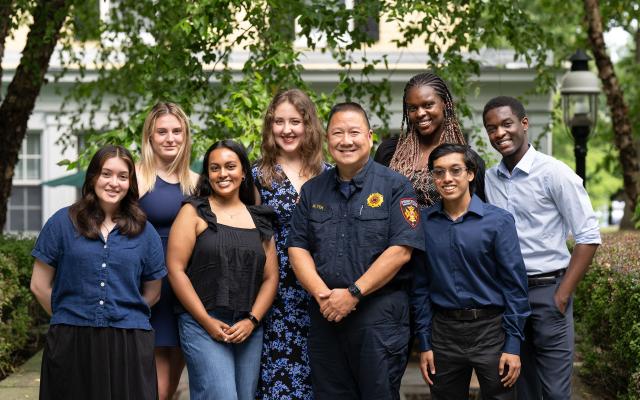
A team of Princeton University undergraduates spent six weeks this summer collaborating with the municipality of Princeton's Office of Emergency Management to help local responders serve the community more efficiently during storms, heat waves, tornado warnings, and other critical weather events.
These students were part of Tiger Challenge, a program that equips students with the skills to understand, analyze, and address multifaceted community issues. The program, housed in the School of Engineering and Applied Science's Keller Center, emphasizes both theoretical knowledge and hands-on implementation.
As they began their research, this summer's Tiger Challenge participants spoke with residents at the Princeton Farmers Market, the Princeton Public Library, the Center for Modern Aging, and other gathering places.
The students asked residents about their experiences during past storms, heat waves, and other critical weather events and how their neighbors and the municipality stayed in contact with them during those times. They learned that what residents needed most in the first hours of a severe storm or similar event was timely, easily accessible information from FEMA and the municipality — and a network of support among their neighbors.
Over the next several weeks, working with Office of Emergency Management director Michael Yeh, the Tiger Challenge students analyzed data to identify and begin to address critical issues, including ideas for improving the user experience on the office’s website and for supporting elderly residents and others with special needs.
The students designed a prototype for a weather emergency toolkit they called the Princeton Prep Pack, which would be weather-resistant, easy to carry, and given to residents free of charge.
The prototype pack includes essential supplies like water, non-perishable food, a flashlight, a first-aid kit, and local emergency contact information. Additionally, it provides a page of conversation prompts and community maps to encourage neighbors to connect and share resources. It also includes accurate information from FEMA and the municipality to ensure residents are well-informed during storms, heat waves, and other weather challenges.
On July 13, the students set up a table on Hinds Plaza to show the prototype to residents and hear their feedback.
Yeh said he was grateful for the opportunity to collaborate with the Tiger Challenge students. "I sought fresh perspectives on emergency preparedness within our municipality. The students have validated existing challenges and identified additional areas for improvement.
“Together, we're striving to implement a more personalized approach to preparedness,” he said. “This initiative has significantly enhanced our capacity to serve the community effectively."
Katya Grygorenko, a Tiger Challenge participant and rising sophomore from Keller, Texas, said she valued the daily collaboration with municipal staff and the opportunity to meet Princeton residents. "I truly feel like a member of the Princeton community now," she said.
“After speaking with so many community members, I've come to appreciate the benefits of fostering relationships beyond the ‘orange bubble,’” said Kevin Edouard, also a rising sophomore from Spring Valley, New York. “I hope that our efforts will empower residents, making them feel more secure and knowledgeable in the event of any emergency.”
“We applied human-centered design principles to tackle emergency management challenges," said Jessica Leung, design educator and design program manager at the Keller Center, who manages the Tiger Challenge. "By engaging directly with the community, we can design solutions that resonate deeply with those they are meant to help.”


